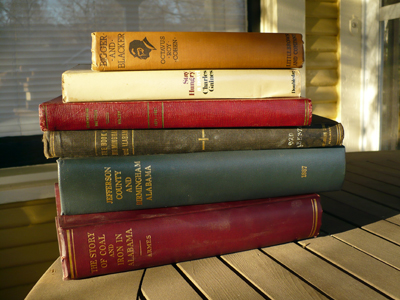It is no secret that Birmingham’s history is one filled with infamous people and colorful events. It’s also one that has been well documented in the pages of books. But books don’t always survive the decades and the ones that do often find themselves buried in the back of used bookstores or hidden away in a grandmother’s attic, until some kind soul stumbles upon these lost books, reads them. Plucking gems of local history from their pages. This a process that Birmingham-area native John Morse knows something about.
I often envision him as the Bruce Wayne of Birmingham book collecting. By day, he is mild mannered Birminghamster working for a local architecture firm, specializing in residences focusing on historic preservation. By night, I envision him donning is crusader’s cape and toils away the hours maintaining Bhamwiki, one of the best online sources for all things Birmingham. It’s a site that’s filled with knowledge plucked from the pages of Morse’s growing collection of books on Birmingham.
“It’s easiest to find histories,” says Morse. “There are numerous church and institutional histories around as well as a recent spate of photo books and commissioned community histories. A lot of what you find, especially before the 1970s is clearly boosterism with varying levels of scholarship. We do, I’m glad to say, have some very good historians working on the subject now – and there seems to be an appetite for it.”
Over the years Morse has waded through this broad survey of Birmingham books, which has given him a unique perspective on the city he calls home.
“I think Birmingham has a stunning (if short) history,” he says. “It was really a place where the big issues of the 19th and 20th century were focused down to the point that they flamed up. If the US had a labor shortage, we had dire straights. If the US built itself up with manufacturing, we were the poster child. If the US had a trade imbalance, we had a crisis. If the US tried prohibition, we tried it three times. If the US faced a depression, we were already up to our necks; and if the US needed to confront racial injustice, the conflict couldn’t get settled anywhere else.”
It’s this repetitive role as cultural “guinea pig” and the people that surround the famous and infamous events in Birmingham’s history that keeps Morse turning pages, digging deeper into our city’s past.”
One theme that keeps recurring is how we tend to let a problem that faces every city in America get so visibly and undeniably bad that someone has to step in and mandate a solution that then serves as a precedent for other areas,” says Mores. “We’re the trailblazers through all the thorny paths — saving other cities from the scars we bear. As a result of political disenfranchisement we’ve empowered our citizenry in a way that is a model around the country even if we don’t make good use of it. The economic transformation of Birmingham in the late 20th century from manufacturing to health care and finance is the envy of any number of cities, even if we don’t realize how good we’ve had it.”
Listening to Morse’s well-read observations like that it’s easy to see what keeps him vigilant in his study of local history and his pursuit of local books.
“What’s really satisfying are uncovering troves of things that I’ve never heard of before,” he says. “For example, I knew that the city once had an extensive streetcar system, but finding Hudson & Cox’s Street Railways of Birmingham with its scores of photographs, maps, and very specific details gives you the tools to be able to imagine what it truly might have been like to hop a train to Tuxedo Junction or for a day at Lakeview Park.”
“I found a few important issues of the Journal of the Birmingham Historical Society on sale at an antique store. Later I was able to get a first printing of Ethel Armes’ landmark The Story of Coal and Iron in Alabama. From that point, you could say I became a collector. I kept my eye out for particularly interesting (or at least well-illustrated) books and came up with a few more before I started BhamWiki.com in 2006. Since then I’ve had a good excuse to buy up anything that can serve as a reference for the site and have been a lot freer with spending. The last few years have also seen a lot of really beautiful new books, as well – so its not hard to fill up a shelf or two.”
Using the Bhamwiki site as a good excuse for purchasing better volumes is a good thing for all of us. One only has to go a click or two deep into Bhamwiki to see this and to gain insight into his personal philosophy of reconciling the printed word and the digital ones on your screen.
“Only a very few of the books I have are truly rare, and I intend to take care of them. Whether in their original bindings or not, the history told in books needs to be preserved and made available to the people in position to repeat our mistakes. Putting some of this material online where people can find it when they need it is very rewarding to me. Some might think that having it online diminishes the need for the original books. In my opinion it has the opposite effect of making more people aware of and interested in finding the original references.”
When it comes to tracking down those original references, like all good collectors, he has his A-list of local sources and some good advice for anyone wanting to find books on Birmingham.
“For finding books, I generally keep an eye on eBay and Abebooks.com. I’d advise people who are interested to certainly visit with Jim Reed at Reed’s Books downtown and to get on the mailing list at the Alabama Booksmith to be notified of new releases and book signings. Both the library and the Birmingham Historical Society have numerous past publications stockpiled away and available for purchase.”
Morse says his interest in Birmingham’s history was born of his memories, as a young boy, of the area’s mining communities (his dad worked for US Steel) and his education at architecture school. It was in his school-related research into these local “model villages” that Morse stumbled upon Birmingham’s rich printed history.
“I came across a monumental book called Birmingham and Jefferson County: Historical and Biographical compiled by John Witherspoon Dubose,” he says. “I was able to borrow this huge book, printed here in Birmingham in 1877, when the city was still a teenager, from the Tulane University library and carry it around for 12 weeks in my backpack.”
Since then Morse has slowly been amassing an impressive comprehensive collection of Birmingham based books. It’s a personal collection that shows his fondness for history and architecture. It is also a collection that has allowed him to accumulate a certain critical mass of local lore and facts that he is happy to pass along to everyone, whether in discussion or via his website.
“My main interest is in documentary history because its something I can digest in small bites and plug into the wiki as I go,” he says. “I really value books where can open them up and pluck out what I need without having to follow the author’s train of thought. I’d like to sit down an enjoy a good comprehensive read, but I find the specifics too distracting. My brain switches into a different mode when I’m reading about Birmingham – alert to details instead of to the big picture because so much of the big picture is right there around me. The upshot is that when I read for pleasure, it has to be on another topic. I’ve got Mencken’s The American Language at my bedside right now. One story I’m eager to learn more about is the Birmingham Batman of the 70s and 80s, cruising around in his heavily-customized convertible helping people in trouble.”
“As for fiction, there are probably more novels and stories around that I don’t see because I’m not looking for them. I’ve picked up a few, including Stay Hungry (I found a signed 1st edition for $5 locally) and Octavus Roy Cohen’s Bigger and Blacker which is the story of a black-owned film studio in Birmingham (unfortunately fictional). I actually haven’t read either of them yet.”
“I don’t have a long list of books I’m dying to track down. I just sort of pick up what I can when it crosses my radar. The main challenge right now is ever getting around to actually reading them.”
trav blogs regularly at {head}:sub/head, about reading, publishing, books and Birmingham.








